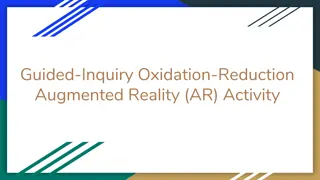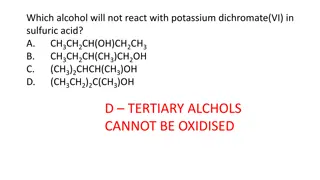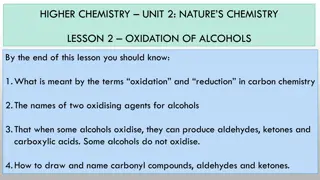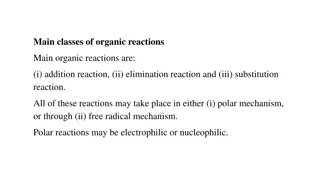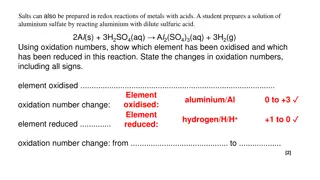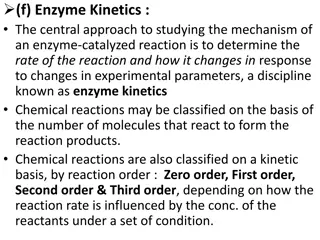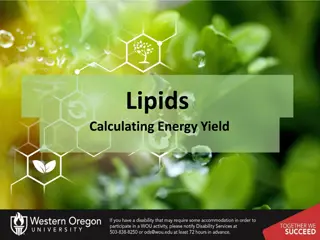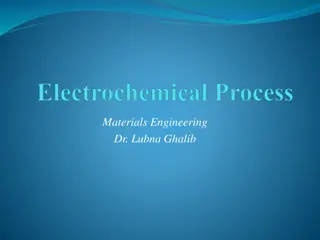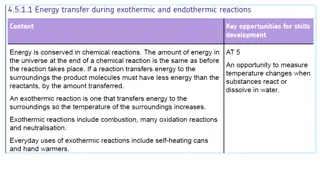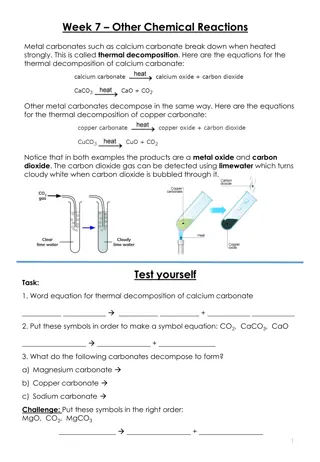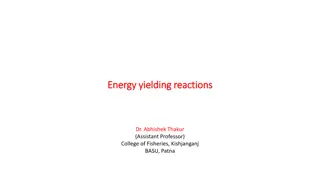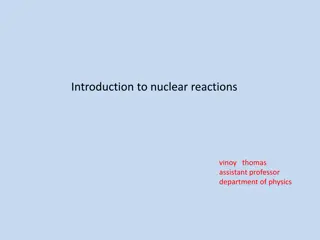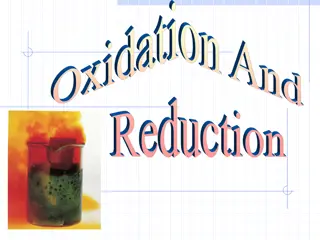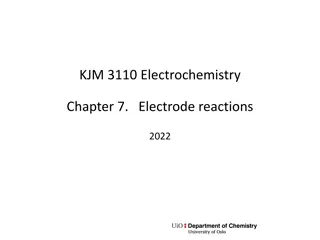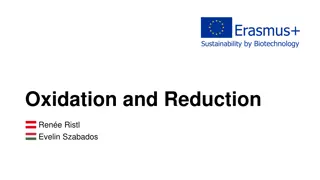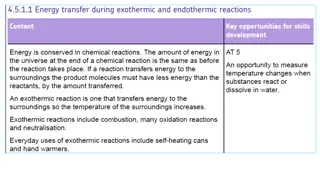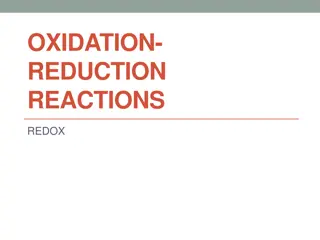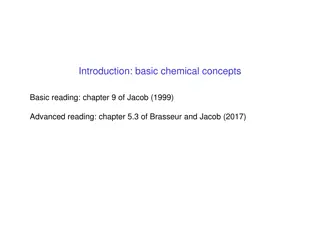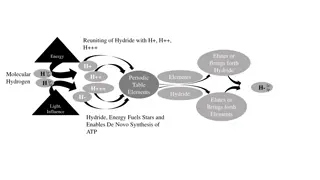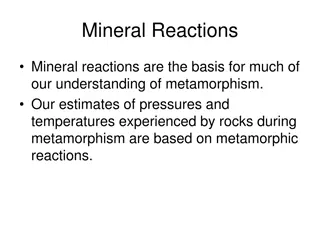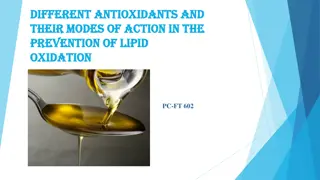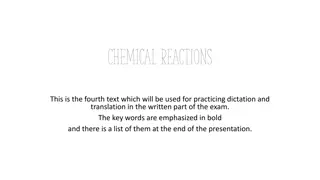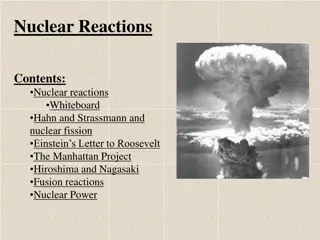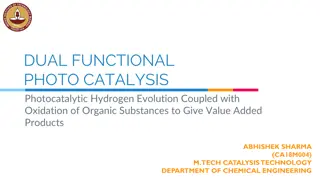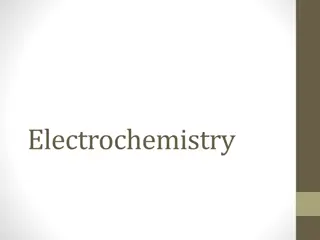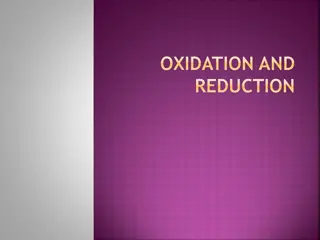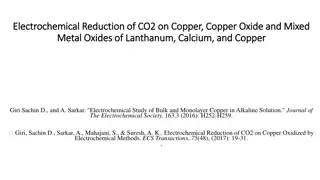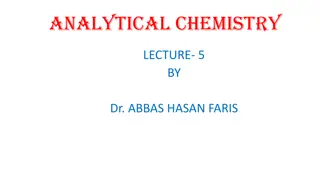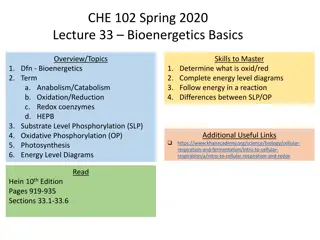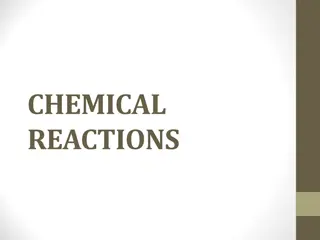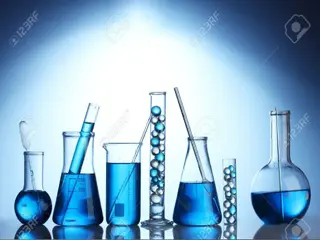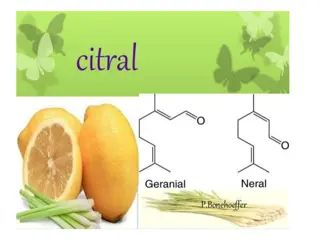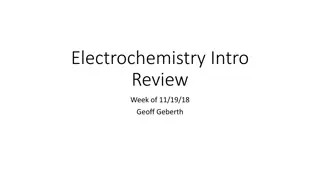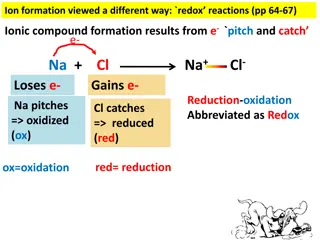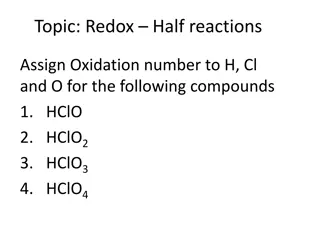Overview of Serious Adverse Reactions and Transfusion Events
This data compilation covers the reporting trends, breakdown of reports, components issued, and specific types of adverse transfusion reactions experienced within the National Healthcare Organization (NHO) from 2019 to 2022. The information includes statistics on Serious Adverse Events (SAE), Seriou
2 views • 46 slides
Augmented Reality Oxidation-Reduction Activity Breakout Session
Engage in an interactive guided inquiry session on oxidation-reduction reactions using augmented reality technology. The session includes team tasks and discussions related to lithium-ion electric car batteries, with designated roles for each member. Participants will access Google Docs for collabor
10 views • 8 slides
Organic Chemistry Reactions Overview
This content covers various aspects of organic chemistry reactions, including the oxidation of alcohols with potassium dichromate, the solubility of molecules in water, and the oxidation of propan-1-ol to form aldehydes or carboxylic acids. It also explores the oxidation of butan-2-ol and the suitab
0 views • 9 slides
Understanding Oxidation of Alcohols in Carbon Chemistry
Oxidation of alcohols involves either adding oxygen or removing hydrogen in carbon compounds, leading to the production of aldehydes, ketones, and carboxylic acids. Primary alcohols can oxidize further to produce aldehydes and carboxylic acids, while secondary alcohols form ketones. Tertiary alcohol
1 views • 13 slides
Overview of Organic Reactions and Mechanisms
Organic reactions can be categorized into addition, elimination, and substitution reactions, occurring through either polar or free radical mechanisms. Polar reactions may be electrophilic or nucleophilic, while free radical reactions involve radicals reacting to complete electron octets. Different
2 views • 26 slides
Understanding Redox Reactions in Chemistry
Salts can be prepared through redox reactions involving metals and acids. This interactive lesson covers oxidation numbers, identifying oxidized and reduced elements, and explaining electron transfer in redox reactions. Examples include reactions of aluminum with sulfuric acid and magnesium with cop
2 views • 12 slides
Exploring Enzyme Kinetics for Understanding Chemical Reactions
Enzyme kinetics is a vital discipline focusing on the rate of enzyme-catalyzed reactions and how they respond to varying conditions. Reactions are classified based on reactant concentration influences. Zero, first, second, and third order reactions are distinguished, with examples like first-order r
0 views • 31 slides
Energy Yield from Lipid Oxidation Process
Understanding the energy generation process from lipid oxidation involves the conversion of fatty acids into Acetyl-CoA through multiple rounds of oxidation, which then enter the Krebs cycle to produce ATP. Each round of oxidation results in the production of Acetyl-CoA, NADH, FADH2, and net gains o
0 views • 7 slides
Understanding Electrochemical Processes in Materials Engineering
Electrochemical processes play a crucial role in materials engineering, specifically in the context of corrosion. These processes involve both oxidation (anodic reaction) and reduction (cathodic reaction) reactions occurring simultaneously. Maintaining a balance between these reactions is essential
3 views • 22 slides
Understanding Energy Changes in Chemical Reactions
Exothermic reactions release energy to the surroundings, exhibited in processes like respiration and combustion. On the other hand, endothermic reactions absorb energy, demonstrated in examples such as photosynthesis. By observing changes in temperature and reactions between various substances, one
0 views • 24 slides
Chemical Reactions and Energy Transfers
Understanding chemical reactions involving thermal decomposition of metal carbonates, identifying exothermic and endothermic reactions based on energy transfers, and recognizing oxidation and reduction in redox reactions.
1 views • 5 slides
Understanding Energy-Yielding Reactions in Biological Systems
Energy-yielding reactions play a crucial role in producing energy for cellular processes. Dr. Abhishek Thakur explains oxidation-reduction, substrate-level phosphorylation, oxidative phosphorylation, photophosphorylation, and biochemical pathways of energy production. These reactions involve electro
1 views • 21 slides
Understanding Nuclear Reactions: A Comprehensive Overview
Nuclear reactions involve direct and compound scenarios, with direct reactions occurring in a short period and compound nucleus reactions leading to long-lived excited states. Different types of reactions like elastic scattering, break-up, and compound nuclear reactions are discussed, highlighting t
5 views • 11 slides
Understanding Oxidation Numbers in Chemistry
Oxidation is a process where atoms or ions gain a more positive oxidation state, while reduction involves attaining a more negative oxidation state. This informative content explains oxidation numbers, uncombined elements, monoatomic ions, and oxidation rules in compounds. Practice determining oxida
5 views • 5 slides
Understanding Electrode Reactions in Electrochemistry
Exploring electrode reactions in electrochemistry involves delving into Faraday's law, coulometry, and the importance of sustainable electrode reactions. These concepts help us understand how the quantity of charge passed affects the production or consumption of substances in electrode reactions. As
4 views • 27 slides
Understanding Oxidation and Reduction in Biotechnology through Erasmus+ Sustainability
Explore the concept of oxidation and reduction in biotechnology with the help of Erasmus+ Sustainability, discussing electron donation, electron acceptance, oxidation numbers, and calculation examples. Learn how these processes work together for sustainable biotechnological applications.
0 views • 5 slides
Energy Changes in Chemical Reactions
Energy changes in chemical reactions can be categorized as exothermic and endothermic. Exothermic reactions release energy to the surroundings, while endothermic reactions absorb energy from the surroundings. Examples and uses of both types of reactions are provided, along with details on measuring
4 views • 24 slides
Understanding Hypersensitivity Reactions and Classification
Hypersensitivity reactions occur in sensitized hosts following contact with specific antigens, leading to injurious consequences. The Gell and Coombs Classification categorizes reactions into Type I, II, III, and IV based on immune response and duration. Type I reactions are immediate and humoral, w
0 views • 30 slides
Understanding Alcohol Oxidation in Organic Chemistry
Explore the oxidation of alcohols in organic chemistry through a series of experiments involving primary, secondary, and tertiary alcohols. Learn how different alcohols react and identify the products of oxidation reactions. Understand the distinctions between aldehydes, ketones, and the classificat
0 views • 31 slides
Understanding Oxidation-Reduction Reactions in Chemistry
Explore the concept of oxidation and reduction in chemistry, which are fundamental processes that occur simultaneously in oxidation-reduction reactions. Learn about the role of oxygen, different types of oxidation reactions beyond burning, such as bleaching stains, and the concept of reduction invol
0 views • 34 slides
Understanding Chemical Reaction Kinetics: From Unimolecular to Three-Body Reactions
Explore the fundamental concepts of chemical reactions, including unimolecular reactions like thermolysis and photolysis, bimolecular reactions, and three-body reactions. Learn about rate constants, reaction mechanisms, and the impact of pressure on reaction rates. Discover how energy transfer, phot
0 views • 9 slides
The Intricate Pathways of Choline Synthesis and Oxidation in Molecular Biology
Delve into the complex processes of choline synthesis and oxidation pathways, involving the integration of hydride ions and various molecules, essential for the production of phosphatidylcholine and other crucial compounds in biological systems. Learn about the enzymes and mechanisms that drive the
1 views • 11 slides
Understanding Mineral Reactions in Metamorphism
Mineral reactions play a crucial role in our comprehension of metamorphism, helping to estimate the pressures and temperatures rocks undergo. These reactions can be categorized as continuous or discontinuous, leading to different mineral products. Discontinuous reactions, exemplified by the transfor
0 views • 6 slides
Understanding Antioxidants and Their Role in Preventing Lipid Oxidation
Lipid oxidation is a crucial chemical process affecting the quality of fats and oils, leading to off-flavors and toxicity. Antioxidants play a vital role in delaying this oxidation process by scavenging free radicals through mechanisms like free radical scavenging. They help prolong the shelf life a
0 views • 12 slides
Understanding Biological Oxidation-Reduction Reactions and Coenzymes
Explore the fascinating world of biological oxidation-reduction reactions catalyzed by oxidoreductases. Coenzymes play a crucial role in these processes, facilitating the transfer of hydrogen atoms. NAD+ is a well-known coenzyme involved in accepting and donating hydrogen. Witness the oxidation of e
0 views • 13 slides
Understanding Fatty Acid Oxidation in Zoology Department with Miss Punam Patil
Explore the process of fatty acid oxidation in zoology, including the entry of fatty acids into mitochondria, TCA cycle outcomes, and differences between mitochondrial and peroxisomal oxidation. Learn about the oxidation of saturated, monounsaturated, and polyunsaturated fatty acids through detailed
0 views • 9 slides
Understanding Chemical Reactions and Catalysts
Chemical reactions involve the formation of new substances from reactants, with key processes like oxidation and reduction. Reversible reactions, endothermic and exothermic reactions, and the role of catalysts in speeding up reactions are explored. The significance of chemical symbols, formulas, and
0 views • 8 slides
Understanding Nuclear Reactions: Fission, Fusion, and Energy Release
This content covers various aspects of nuclear reactions, including nuclear fission, fusion reactions, the Manhattan Project, and examples of reactions involving different particles and elements. It explains concepts like exoergic and endoergic reactions, conservation of charge and nucleon number, a
0 views • 34 slides
Dual-Functional Photo Catalysis: Hydrogen Evolution & Organic Oxidation
The research explores dual-functional photo catalysis, combining hydrogen evolution with the oxidation of organic substances to produce value-added products. It focuses on utilizing photoelectricity to create electrons for hydrogen production and organic molecule oxidation. The study investigates th
0 views • 14 slides
Understanding Electrochemistry Concepts and Redox Reactions
Explore the fundamentals of electrochemistry, oxidation-reduction reactions, and identification of redox components. Learn about oxidation states, electron transfer, and half-reactions. Dive into examples and visual aids to grasp the concepts easily.
0 views • 42 slides
Understanding Oxidation and Reduction Reactions in Chemistry
Dive into the world of oxidation and reduction reactions through displacement reactions and ionic equations. Explore how atoms turn into ions, learn about spectator ions, balance electrons in half equations, and grasp the definitions of oxidation and reduction (OILRIG). Discover which elements are o
0 views • 11 slides
Electrochemical Reduction of CO2 on Copper and Mixed Metal Oxides
Different methods for CO2 reduction have been studied, with electrochemical reduction showing promise due to its use of electricity from nonconventional sources. Research on copper's unique characteristics for producing various CO2 reduction products has led to investigations into optimizing activit
0 views • 30 slides
Understanding Oxidation-Reduction Reactions in Analytical Chemistry
Oxidation-reduction reactions play a crucial role in various chemical processes, including photosynthesis and corrosion. This content delves into the basics of redox reactions, explaining how electrons are transferred between reactants, leading to changes in oxidation numbers. Examples such as the r
0 views • 10 slides
Bioenergetics Basics: Overview, Topics & Energy Diagrams
The content covers the fundamentals of bioenergetics, including topics like anabolism, catabolism, oxidation, reduction, redox coenzymes, substrate-level phosphorylation, oxidative phosphorylation, and photosynthesis. It also explores energy level diagrams, metabolism, oxidation-reduction reactions,
0 views • 21 slides
Understanding Energy in Chemical Reactions
Chemical reactions involve the release or absorption of energy in various forms like heat, light, sound, and electricity. Exergonic reactions release energy, while endergonic reactions absorb energy. Catalysts speed up reactions, while inhibitors slow them down without changing the amount of reactan
0 views • 8 slides
Understanding Volumetric Analysis in Chemistry
Volumetric analysis involves various types of titrations such as acid-base, precipitation, complex formation, and oxidation-reduction. It requires a clear endpoint, precise measurements, and specific conditions for reactions to occur accurately. Standard solutions are used as titrants, and the react
0 views • 11 slides
Citral Oxidation and Reduction Reactions in Organic Chemistry
The oxidation of citral with moist Ag2O yields geranic acid with the same number of carbon atoms. On the other hand, reduction of citral with Na-amalgam in dilute acid results in the formation of a primary alcohol. These reactions showcase important transformations in organic chemistry, specifically
0 views • 12 slides
Understanding Electrochemistry: A Comprehensive Overview
Dive into the world of electrochemistry with this detailed review covering topics such as oxidation, reduction, half-reactions, and the significance of oxidation numbers in balancing redox equations. Explore key concepts like OIL RIG (Oxidation Is Loss, Reduction Is Gain) and learn how to apply elec
0 views • 17 slides
Understanding Redox Reactions and Ionic Compound Formation
Explore the concept of redox reactions through the process of ion formation, where elements lose or gain electrons to create ionic compounds. Learn about oxidation (ox) and reduction (red) in chemical reactions, and how to identify which elements lose or gain electrons based on charge changes. Disco
0 views • 14 slides
Understanding Redox Half Reactions: Assigning Oxidation Numbers and Half-Reactions
In this content, we explore assigning oxidation numbers to elements in compounds such as HClO, HClO2, HClO3, and HClO4. We then delve into the Haber Process to understand redox reactions. The concept of oxidation and reduction, as well as the significance of electrons in these reactions, is illustra
0 views • 20 slides

